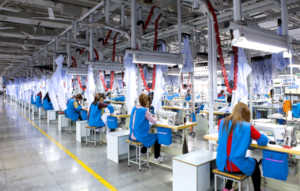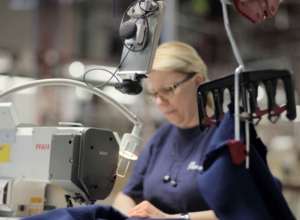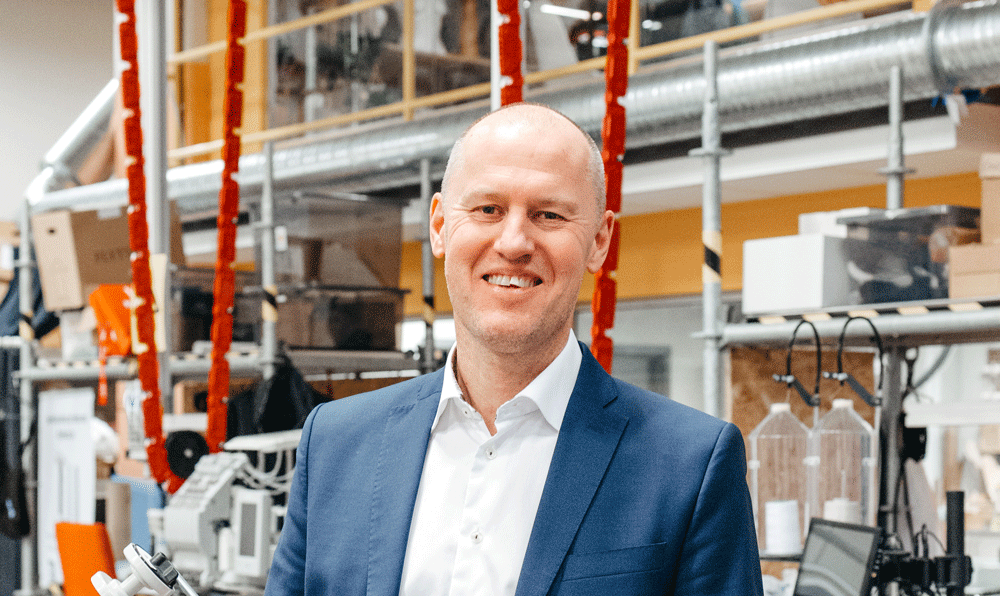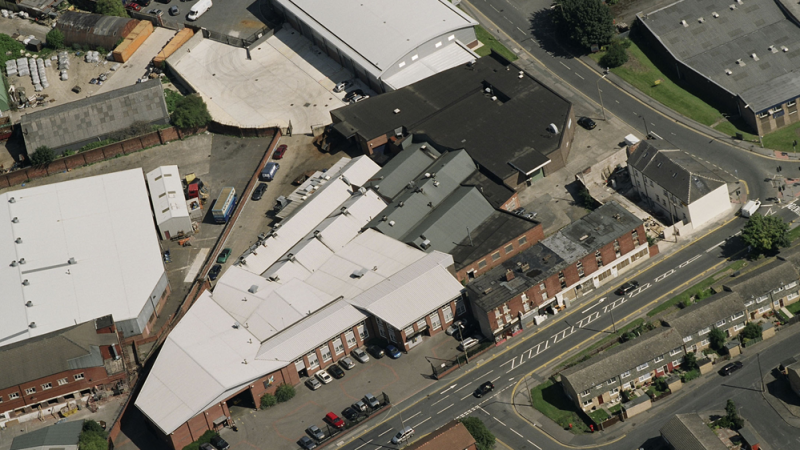Located in Borås, the textile region of Sweden, Eton Systems was founded in 1967 when the conveyor business was divested from Eton Fashion, a Swedish company making shirts since 1928. Early on, the company founder Inge Davidson realised the benefits of streamlining production process, minimizing downtime and maximising efficiency and invented a novel system.
“‘When the needles are moving – we’re creating value,’ that was Inge Davidson’s notion that became the basis of the world’s first Unit Production System (UPS),” says CEO Jerker Krabbe. “He designed a hanging conveyor system that didn’t waste valuable floor space and required no major modification to existing machines. His system allowed all the material needed for a specific garment to be moved as a unit directly from the sewing machine of any workstation to the next, substantially increasing efficiency.”
Over the years, the Eton system has grown into one of the most versatile conveyor systems available, and one that can automate almost any kind of industry. Today, there are more than 4,500 Eton systems installed in more than 75 countries and in different production areas, including garment, home textiles, furniture, plastic, and automotive industries.
In 2022, the company experienced an important milestone with a management buyout that initiated enhancements to make the business better suited for the future. “Completing changes in the wake of a global pandemic, and in the middle of a turbulent geopolitical and economic situation was a challenge but given the brand strength and its global reach, we have steered the business through the difficult times better than most,” affirms Krabbe.
 The Eton concept
The Eton concept
Eton Systems provides material handling systems consisting of individually addressable product carriers, automatically finding its way to the correct operation. The systems are designed to eliminate manual transportation and minimize handling, radically increasing the time for adding value to the products.
The material handling solution from Eton Systems increases efficiency in all kinds of industrial production and the aim is to minimize work in progress. Some even say that Eton Systems started practicing Lean Manufacturing even before it became a concept.
Crucially, the systems include a real-time information function and the necessary tools to improve the manufacturing processes through powerful software programs. Krabbe points out that almost all material handling systems from Eton Systems are unique and designed to fit different production lines at different production sites.
“Eton system is the Rolls Royce of a conveyor system. Our key strength is our know-how, the combination of hardware and software; we offer a new production mindset to a factory. As such, we can’t just install the system and run; we have life-long relationships with our customers, who rely on us to improve their productivity and profitability.”
“Similarly as with our customers, we foster long-term, close relationships with our suppliers that start in the very first stages of product development – we developed the understanding and knowledge together. Quite simply, without trusted suppliers we would not be able to secure the high quality of our systems.”
 New premises
New premises
Krabbe points out that Eton Systems is welcoming the reshoring of textile industry back to Europe and USA, as manufacturers are seeking to reduce their environmental footprint and ensure reliability of supplies, while striving to reduce cost by means of automation. Something that Eton Systems can certainly provide.
“Digitalisation and the push for more sustainable, shorter and less expensive supply chains are currently making manufacturing in high-cost countries within Europe and North America more attractive and our technologies are very much a part of making reshoring a feasible option for our customers”
“The automation trend is very strong, and our systems connects all elements to be in line with the Industry 4.0 concept, so that the processes can be monitored remotely from anywhere in the world. Our system also enables tracking and tracing of individual operators’ performance, providing manufacturers with full transparency of the factory environment. These are only some of the benefits that our systems offer.”
He acknowledges that to meet the rising demand for its automated fabric and part handling solutions, the company has just implemented a strategic investment in a new production facility in Borås. The new premises were officially opened in May.
“Staying here in Borås, we are staying true to our roots and heritage,” he says. “In addition to a pleasant working environment for our people, the new factory offers many benefits – we have optimised production flows to match those of our customers, and introduced hardware and software demo systems so that customers can see Eton systems’ benefits for themselves. We demonstrate that if we can do production in Sweden and be profitable, so can they. It only needs the right quality and the right brand.”
One of a kind
Krabbe insists that reducing carbon footprint is very important for Eton Systems and that the new factory reflects environmental considerations in terms of using less energy and less chemicals and a much more efficient production flow in general. “Externally, we have been working with customers to move away from fast fashion, developing systems that can track and help recycle garments.”
Looking ahead, he affirms that although Eton Systems was born in the textile industry, the systems are applicable to any type of business. The most recent incarnation of the original Eton UPS concept is now gaining recognition as the industry standard for precise and comprehensive production control by leading global manufacturers, as the system offers unparalleled level of flexibility, quality, and return on investment.
‘Our challenge is now to prioritize our resources across the segments that could profit from an Eton system. It could be plastics, it could be bicycles, it could be anything that needs to be transported. It’s about getting the word out there and spreading our reputation. Our system, manufactured to the highest quality, is one of a kind and the future looks very exciting.”




